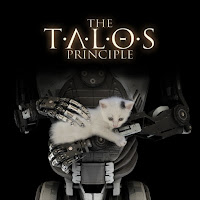A philosophical puzzle game
Even more apt a comparison, aside from gameplay, would be SOMA. The games' narratives are so similar in fact that I'd be surprised if SOMA wasn't influenced by The Talos Principle, which was released 10 months earlier. There's even an in-game email that tells how the Talos project was first going to be called SOMA but after fighting with sponsoring corporations about a fitting backronym for it, the project people ended up hating the name and came up with The Talos Principle instead.
What makes a person a person? Can a person exist as a reasoning compilation of memories alone or is a body needed?
The game's approach to the subject matter is slightly different than SOMA's. I didn't find it as engaging, maybe because I had already gone through similar concepts in a game but also because of the more abstract environments and repetitive puzzle solving. The narrative isn't as immersive or personal.
The Talos Principle doesn't struggle with plausibility as much as Portal-likes usually do, however. The place is a computer simulation; not some unjustifiably huge, physical puzzle complex. The game comes pretty close, if doesn't even outright succeed at rationalizing puzzle solving as something with a purpose. One message even states the simulation was built upon some existing game -- an in-game explanation for the repeating assets and bit of a meta thing as well, considering how the game came to be when Croteam was experimenting with interactive objects for Serious Sam 4.
You don't get a special tool, such as the portal gun. Instead puzzles are solved with objects found within each puzzle chamber. There are jammers to turn off things, cubes for pressure plates and to climb onto, crystal refractors to guide lasers, etc. The most complex puzzles involve first recording and then playing co-op with yourself, so to speak. Those puzzles sometimes involve a plate that you carry and on top of which you can then jump. It's thematically a very fitting puzzle element for the game -- you literally stand on the shoulders of a past iteration.
I solved every regular puzzle without a guide; none of them are overly difficult though some definitely do require more effort. I did however look up how to get few of the golden stars that are required for an optional side ending. The stars don't follow the usual rules. To get them, you need objects from other puzzles and/or they are hidden outside the rooms. One star even requires you to scan a QR code for a hint.
The Talos Principle has no visible loading screens once you get in. You can travel back and forth between areas, even to the very beginning if you so desire. You can to some degree go solve chambers out of order but since most areas are locked behind tetromino locks whose pieces you get from solving the regular puzzles, you might as well keep going through locations in order. Traversing the world is pleasant enough with the satisfyingly fast (and adjustable) movement speed.
The final bits of the main ending of the game I found refreshingly different even though it still used the same mechanics. You ascend the game's forbidden tower while solving a chain of puzzles. I failed it on my first attempt after I got confused and took too long. The last section is timed and it becomes harder and harder to see when the simulation starts breaking under and around you.
One thing I disliked in The Talos Principle was the entity you encounter while reading the many terminals in the game world. At first there are only text excerpts (fictional and non-fictional) to be found on them but eventually someone or something starts messaging you. You always have a limited selection of replies and I particularly didn't enjoy how the entity often asserted its own opinions to my answers and then said something different without allowing me to correct its assumptions. I feel the interactions were clumsily written. I couldn't properly express myself to it.












No comments:
Post a Comment